So, I got the chance to cover England’s opening Euro 2012 qualifier against Bulgaria at Wembley. As my first game covering the Three Lions as an accredited member of the media, I thought I’d better note down some memories…

Wembley way: My view from my privileged position at the home of football
I never thought I’d get an England call-up at 23.
Okay, so Theo Walcott or Wayne Rooney might not be particularly impressed with my achievement — nor any player to actually get a proper cap for England, for that matter — but when your professional football dream falls apart at the age of 12 and you subsequently try to make the media your career like I have, then your first appearance in the hallowed press zone at Wembley seems like a milestone worthy of some note.
I wouldn’t call it a debut to remember by any means, but I think I got through the 90 minutes with enough nice touches to suggest I might one-day have a future at this level. A nervous start (my wide-eyed fear and hesitancy upon entering the media centre seemed to only convince the security attendants I harboured terrorist intent) eventually subsided into an enjoyable and slightly more self-assured second-half performance, and by the end of it I was… blocked from entering the mixed zone.
So, er, still work to be done then.
Nevertheless, it was a great experience. Wembley, as you would expect, is run like clockwork, with helpful and seemingly endless numbers of staff making sure you don’t get too far off the yellow brick road. One polite lift attendant (believe it) even indulged in small talk with myself and the BBC’s very own ‘expert’ Mark Lawrenson on the way up to the media centre, with the former Liverpool man even opining that “with programmes costing £6, I’m in the wrong game.” The attendant was happy to agree with him, which I can only assume was out of politeness, as spouting inane clichés about football every Saturday evening seems about as a good a ‘game’ as you can be in to me.
But I digress.
The media centre itself is something of a joy to behold, divided as it is into two sections. The first, slightly smaller in size, looks like a high-tech library with its rows of identikit cubicles with ports and wires for every computer accessory known to man. Continue reading →
September 6, 2010
Posted by alexdimond |
Comment, World Football | england, Wembley, World Football |
1 Comment
Financial meltdown, a Welsh invasion and gay footballers are all on the agenda as CatchSeventy7 takes a look at what might happen to English football during the next ten years…
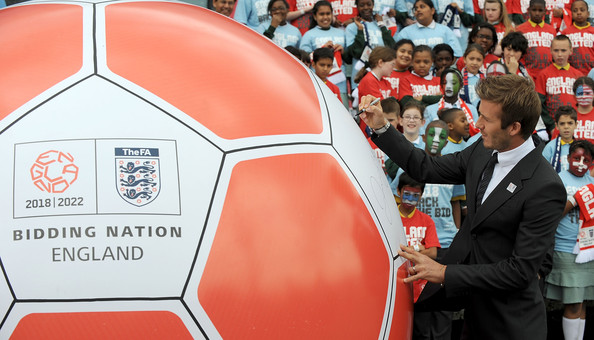
England expects: Fans are hoping David Beckham can (almost single-handedly) land the 2018 World Cup
The Noughties was a good decade for English football — indeed, some would say it was a great one.
The Premier League established itself as the most popular and lucrative competition on the planet, attracting star players and increasing the quality of football on display to an ever growing audience.
The next decade — is it the Teenies, the Tennies, or something else? — has the potential to be equally groundbreaking, with England likely to host a World Cup and many respected officials in the sport widely predicting the emergence of a European Super League.
Below I will take a brief look at just ten changes I believe will come into effect by the time 2019 draws to a close:
Continue reading →
January 2, 2010
Posted by alexdimond |
Sport, World Football | Aaron Ramsey, Justin Fashanu, premier league, World Football |
Leave a comment
He’s been signed as the hitman that will lead Manchester City to the sort of success their wealthy backers expect. But Emmanuel Adebayor should take a leaf out of another African striker’s book if he is to ever truly make the maximum of the potential he undoubtedly has…

Making a point: But Adebayor still has to prove his heart lies with Manchester City's ambitions, not their money
As far as starts go, perhaps few can have too many complaints about Emmanuel Adebayor’s early career at Manchester City.
In the nine Premier League games in which Adebayor has featured this season, the striker has scored five goals, and laid on a further three assists for his teammates.
On paper, then, it is a solid return from the 25-year-old after joining the Eastlands outfit from Arsenal for £25 million during the summer.
As has often been the case with Adebayor in England, however, the positives have been offset by a number of negatives. In no game was that better encapsulated than when he faced his former club earlier in the season.
Throughout the game against his old team-mates, the Togolese international was often at his blistering best.
He tormented the Arsenal players — taking advantage of their seemingly reckless desire to clatter him — but then proceeded to torment their fans after his well-taken goal.
That celebration, running a full 90 yards to gloat in front of those who had spent much of the game abusing him, earned him a three-game suspension after a review by the Football Association.
City, without their leading scorer, subsequently lost their next league game against arch-rivals Manchester United, in a cruel 4-3 thriller.
“I had a bad afternoon against Manchester United because I am sure that if I had played that day then I would have scored a goal,” Adebayor said.
“It was a shame that we lost in added time. United did not deserve to win—a fair result would have been a draw.”
Rather than bemoaning missing out on a chance to add to his goal tally, however, Adebayor should perhaps have been reflecting on his own conduct. His performance against Arsenal helped the team, but his subsequent conduct certainly didn’t.
That just isn’t good enough for a top striker. Continue reading →
November 27, 2009
Posted by alexdimond |
Comment, Sport, World Football | Didier Drogba, Emmanuel Adebayor, manchester city, World Football |
Leave a comment
As a rule Catch Seventy7 is not really a big fan of lists, but every once in a while exceptions must be made…
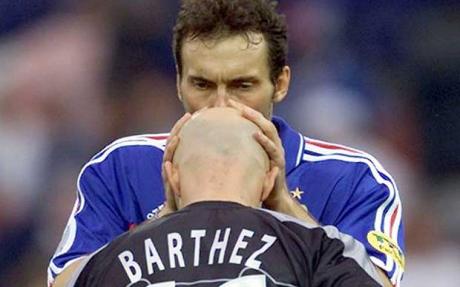
Blanc and Barthez: Bromance (Photo: Reuters)
When it comes to superstitions, footballers are in a class of their own. Whether it be wearing the same piece of kit for a decade, or carrying out the same pre-match rituals, footballers will do anything if it makes them believe they will play better. Here are just 10 of the best footballing superstitions:
1. Malvin Kamara
When it comes to superstitions, the former Huddersfield midfielder certainly takes the biscuit. Or, more accurately, the chocolate. The 25-year-old watches Willy Wonka and the Chocolate Factory before every game he plays.
“It really helps to get me in the right mood for what lies ahead,” the 25-year-old revealed.
”That is the original Gene Wilder version I’m talking about though, the Johnny Depp one just offends me.” Obviously.
2. Romeo Anconetani
Former Pisa president Romeo Anconetani, renowned for his eccentric ways, had an unusual pre-match superstition. Before every one of his side’s games the Italian would throw salt onto the pitch. And the bigger the game, the more salt he would throw. In one particularly important match against local rivals Cesena, Anconetani distributed 26kg of salt on the pitch. Well seasoned.
Continue reading →
July 10, 2009
Posted by alexdimond |
Sport | Superstitions, World Football |
Leave a comment
Well regarded in France, if hardly lauded as one of their finest prospects. Nevertheless, Manchester United have seen enough in Gabriel Obertan to persuade them their coaching methods can bring out the best in their new £3m signing…
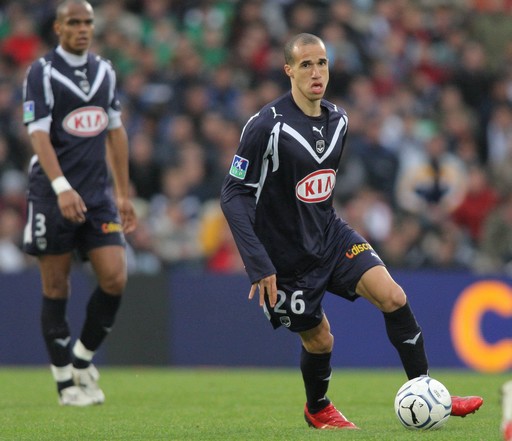
Obertan's natural ability could do with some refinement (Photo: Teamshoot)
With the summer signings of Michael Owen, Luis Antonio Valencia, and now Gabriel Obertan, Manchester United have hardly captured the imagination of their worldwide fanbase.
£17 million Valencia, a star performer in a solid Wigan Athletic team last season, has been viewed as a decent, if unspectacular signing to offset the loss of the irreplaceable Cristiano Ronaldo.
Michael Owen was undoubtedly one of the world’s best strikers once upon a time, but many supporters remain to be convinced that the 29-year-old, arguably 11 years removed from his finest hour as a player, will be able to replace the effort, goals and overall contribution that Carlos Tevez brought to the club.
And as for the £3 million Obertan; while 80,000 Madrid fans turned out to see Cristiano Ronaldo’s unveiling at Real Madrid, it is perhaps doubtful that even that many United fans had ever heard of the former Bordeaux winger.
Nevertheless, Sir Alex Ferguson has done his homework in scouting the wideman, and has seen enough to lead him to believe he has the potential to succeed at the club.
“Gabriel is a player we have tracked for a few years now, but because of his educational programme [at the famed Clairefontaine academy] our efforts to get him here have always been delayed,” Ferguson said. “We are delighted to get him now, as he is an exciting prospect.”
The 20-year-old had long known of United’s observation of him, but admitted ahead of his move to England that he thought the opportunity for him to join the former European champions had passed.
“I knew they had been following me for a few years but I did not think it was going to happen this season,” Obertan told French radio station RMC.
“We had no longer been in too much contact until the England U-21 game where I played well for France and scored a goal. That helped things along. We spoke again, and I ended up signing.”
For pundits and fans alike, however, the Obertan signing is not one that has been greatly celebrated. Partly this is a result of Obertan’s relative obscurity, but it is also a result of the Frenchman’s fairly uninspiring CV.
After all, as former club Bordeaux chased a first league title in ten years last season, manager Laurent Blanc deemed Obertan expendable enough to be allowed out on loan to lowly Lorient for the second half of the campaign.
While his teammates went on to clinch the title, Obertan managed a meager one goal in 15 appearances with the Ligue 1 mid-table side.
But Blanc, if not a confidante then certainly a close acquaintance of Sir Alex (having played under the Scot at Old Trafford during the later part of his career), will not have sold his former manager a complete dud, and Obertan does have pedigree at youth level.
He won the most valuable player award at last month’s international Toulon tournament, and Ireland fans will remember him as a player who tore apart their U21 side in a friendly last year. As United witnessed, he was also instrumental as France beat England at U21 level earlier this year.
The French World Cup winner is more than aware of his former charge’s promise, but realistic enough to realise that the French club (especially with the likes of Yoann Gourcuff reducing first team opportunities) might not be best environment for him to progress.
“I was surprised [when United came in with a bid], but it is an unexpected chance for him to play with one of the best clubs in the world,” Blanc said recently.
“Manchester United certainly hope to advance him, something that Bordeaux and Lorient have failed to do. He has the potential, but he must overcome psychological and mental challenges so he can express his true value.”
United will be confident they can help Obertan overcome such obstacles, and that their coaching methods will prove more productive than Bordeaux’s.
Signing a player for £12.25 million and selling him five years later for £80 million will give a club great faith in the training methods they employ, and that is exactly what United achieved with Cristiano Ronaldo.
When the Portuguese winger arrived at Old Trafford, he was a young player with great athletic ability and natural skill, but lacking any sort of end product—something his former club Sporting Lisbon were struggling to address.
Much like Obertan.
Under United’s tutelage, however, Ronaldo is now one of the finest players in the world, with a goalscoring (and assist) record that compares with the very best.
United’s back-room staff must take a lot of credit for that.
While calling Obertan Ronaldo’s heir might be overly optimistic, a prolonged stay at Old Trafford will undoubtedly develop his talents to a level he could previously only aspire to.
At 6’2″, Obertan has the physical presence to survive in the Premier League. Like Ronaldo, he has already demonstrated the sort of trickery and natural speed that cannot be taught, no matter who the coach is.
It is his positioning, awareness and technique—among other things—that need work. These are all aspects that United’s coaching team, led by Mike Phelan, will be confident they can address.
“We like to get young players and develop them, and we will see that in Gabriel over the next two years,” Ferguson said.
Before signing the 20-year-old, Ferguson will no doubt have sat the winger down and underlined to him exactly how he sees him progressing, and how much effort he will have to put in in order to succeed. Ferguson will have wanted assurances that such a commitment will be made before finalizing a deal.
Publicly at least, Obertan seems to have taken that message on board.
“This is a big opportunity for me to play at such a great club,” Obertan said. “It’s my potential that interests him [Ferguson]. He has confidence in me. It is flattering and surprising—but I know I still have a lot of work to do.”
Obertan joins Zoran Tosic, Nani, Valencia, and Adem Ljajic (currently on loan at Partizan Belgrade) as the naturally-talented young attackers on United’s books.
And with the quality of nuturing available to them from United’s world-class staff, Sir Alex Ferguson will be confident that in the near future at least one of them, if not more, will develop into able successors for the departed Ronaldo.
With the summer signings of Michael Owen, Luis Antonio Valencia, and now Gabriel Obertan, Manchester United have hardly captured the imagination of their worldwide fanbase.
£17 million Valencia, a star performer in a solid Wigan Athletic team last season, has been viewed as a decent, if unspectacular signing to offset the loss of the irreplaceable Cristiano Ronaldo.
Michael Owen was undoubtedly one of the world’s best strikers once upon a time, but many supporters remain to be convinced that the 29-year-old, arguably 11 years removed from his finest hour as a player, will be able to replace the effort, goals and overall contribution that Carlos Tevez brought to the club.
And as for the £3 million Obertan; while 80,000 Madrid fans turned out to see Cristiano Ronaldo’s unveiling at Real Madrid, it is perhaps doubtful that even that many United fans had ever heard of the former Bordeaux winger.
Nevertheless, Sir Alex Ferguson has done his homework in scouting the wideman, and has seen enough to lead him to believe he has the potential to succeed at the club.
“Gabriel is a player we have tracked for a few years now, but because of his educational programme [at the famed Clairefontaine academy] our efforts to get him here have always been delayed,” Ferguson said. “We are delighted to get him now, as he is an exciting prospect.”
Continue reading →
July 9, 2009
Posted by alexdimond |
Sport, World Football | Gabriel Obertan, manchester united, World Football |
Leave a comment
He wasn’t the best footballer, he wasn’t the worst. But, as exemplified by the way it ended, Steve Savidan’s career was a story more worthy than those of most of his peers…
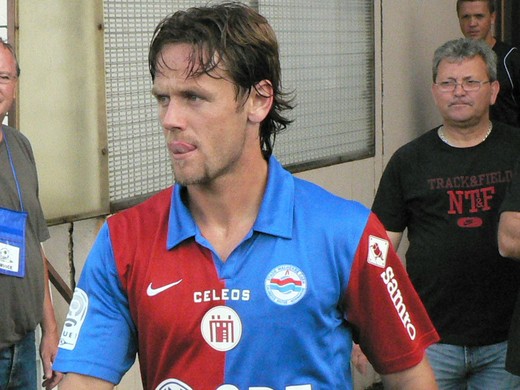
Savidan lived up to the hype at Caen...
Oh, the irony of life.
A week ago, Steve Savidan was just another footballer nervously awaiting a transfer that might elevate his professional career.
Today, as a direct result of such a transfer materialising, the French international is resigning himself to the fact he will never play football at the highest level again.
A player renowned for his heart and resilience, Savidan has seen his career ended without warning by a problem with the one organ on which he could always rely.
Expecting to complete a move over the weekend from recently relegated Caen—for whom he scored 14 goals in 38 games last season—to one of France’s biggest sides, AS Monaco, only a medical stood in the former journeyman’s way.
But, in the same week where a successful medical reignited the career of an injury prone Michael Owen, the discovery of a severe heart defect by the Monaco physios has had the opposite effect on the Savidan—a player for whom fitness was rarely a problem.
“Unfortunately, signing for Monaco is no longer possible,” Savidan was forced to announce over the weekend. “The tests show there is a cardiac anomaly that has recently appeared. It is a real mental blow. It is likely that the doctors will not let me pursue my career.”
If Caen had not been relegated, if Savidan had not been forced to move to keep his slim international hopes alive, then perhaps he would have continued played—ignorant to the perilous danger he was in.
But throughout his career Savidan has not had much time for “what ifs”. He’s just dealt with problems as they arise. And he is well-versed in overcoming adversity.
After all, football hasn’t always been kind to him.
Barely five years ago, Savidan was supplementing his measly income with non-league Angoulême by working a number of menial jobs. One of those was as a binman—a fact that would mare the headlines he would subsequently make throughout his career.
Angoulême was his sixth club. Having already failed to make an impact at the previous five, it looked likely that striker had a better chance of making a living from emptying the trash than scoring goals.
Savidan would prove the doubters, and to an extent himself, wrong however, as he suddenly found his goalscoring touch (12 in 37 games) with the lowly side.
“I am proof that the system doesn’t always work,” said Savidan recently. “I was born at the wrong time. I’m from the same generation as Henry and Anelka [he is the same age as both men] and when they were coming through you had to be well over six-foot to be picked for youth schemes. I’m quite a bit under six-foot.”
A move to Valenciennes—a once respectable side, who had fallen out of the top divisions—materialized, and it was there that the 5’9” Savidan discovered it was his head—his heart had never been in question—that had held his career back.
“Whenever I was given a chance in the past I didn’t take it,” Savidan later said. “It’s possible that I destroyed myself. Very possible, in fact. You could almost say I was suicidal. But then I was analysed and helped by the right people, specifically a psychiatrist at Angers and a GP at Valenciennes.”
Mentally more assured, Savidan proceeded to shoot his new team to two promotions in succession, back into France’s top division, Ligue 1.
There, his goalscoring touch did not desert him, and he proceeded to score 25 goals over two seasons for unfashionable Valenciennes, including four in one game past the World Cup winning goalkeeper Fabien Barthez.
At the end of the 2007-08 season, Caen came calling and bought the former binman for €5m.
Savidan just kept scoring.
Soon, talk of an international call-up began to emerge. By now a 30-year-old, Savidan held little hope of such a dream materializing so late in his career. The last French player to earn his debut at 30 was Franck Juretti in 2005, and his international career lasted just 10 seconds.
The last Caen player to be called up to the French squad was in 1992.
But that didn’t stop him imploring coach Raymond Domenech to consider it.
“Imagine if it works,” Savidan said during an interview in 2008. “Imagine if I hit two goals just like I’ve dreamed of doing since I was a kid. Where’s the risk in trying? If I don’t fit in, I’ll toddle back to where I came from and you can say ‘see, I told you he wasn’t up to it.'”
Whether it was the impassioned speech or his impressive goalscoring record that did the job, Savidan got his wish as Domenech called the striker up for France’s friendly against Uruguay.
In the second half, Savidan would achieve his ambition as he made his international debut in front of 79,000 at Stade de France. But there would not be the realization of the two-goal dream he had since childhood, as the game finished 0-0.
It would be Savidan’s only international appearance.
But then, one is always better than none.
Only a week ago, the spectre of undiscovered heart defects was brought sharply into focus as the Confederations Cup final become a stage to remember the death of Cameroon international Marc-Vivien Foe, who died of a heart-attack on the pitch, aged just 27.
Foe’s death, along with that of Hungarian Miklos Feher, made FIFA sit up and realise something had to be done to prevent such fatalities in future.
Savidan’s situation proves that such testing is getting better and prevention is becoming the norm, but hopefully it will also encourage FIFA to realise that they cannot rest on their laurels, that players of all ages and at all levels should have the opportunity to be tested against such life-threatening problems.
With his career brought to an abrupt halt, at least Savidan can look back with pride on what he managed to achieve, overcoming the odds.
And at least he will live to face the challenges of another day, whatever it may bring.
Oh, the irony of life.
A week ago, Steve Savidan was just another footballer nervously awaiting a transfer that might elevate his professional career.
Today, as a direct result of such a transfer materialising, the French international is resigning himself to the fact he will never play football at the highest level again.
A player renowned for his heart and resilience, Savidan has seen his career ended without warning by a problem with the one organ on which he could always rely.
Expecting to complete a move over the weekend from recently relegated Caen — for whom he scored 14 goals in 38 games last season — to one of France’s biggest sides, AS Monaco, only a medical stood in the former journeyman’s way.
But, in the same week where a successful medical reignited the career of an injury prone Michael Owen, the discovery of a severe heart defect by the Monaco physios has had the opposite effect on the Savidan — a player for whom fitness was rarely a problem.
“Unfortunately, signing for Monaco is no longer possible,” Savidan was forced to announce over the weekend. “The tests show there is a cardiac anomaly that has recently appeared. It is a real mental blow. It is likely that the doctors will not let me pursue my career.”
Continue reading →
July 6, 2009
Posted by alexdimond |
Sport, World Football | Steve Savidan, World Football |
1 Comment
Few predicted it (although Catch Seventy7 weren’t far off), but bearing the giant hurdle of a thorough medical, it looks likely Michael Owen will sign for Manchester United. Is Fergie hoping Owen will become Solskjaer Mk II?
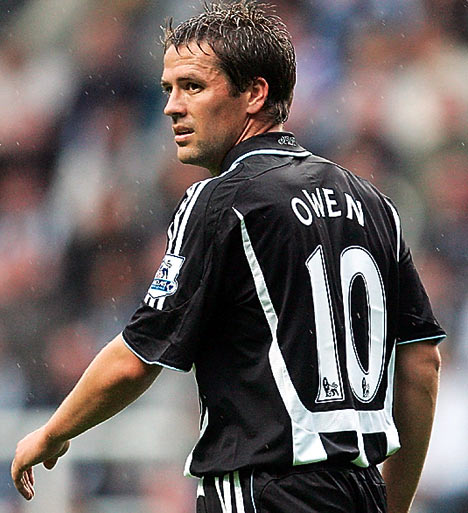
Michael Owen: Made it through the rain...
It has not been a particularly happy few months for Michael Owen.
First he saw his then-employers, Newcastle United, suffer a heart-breaking relegation from the Premier League while he was forced to watch much of the run-in from the treatment table.
Then, as his contract expired, he had to sit back as newspapers and fans alike almost unanimously wrote him off—with one national paper even suggesting he should retire.
Commendably, Owen remained upbeat, and kept his dignity intact.
“When I scored a goal in the World Cup as an 18-year-old, people six months later were writing me off saying, ‘It’s a one-off’,” Owen said in a rare interview during his difficult period. “There will be something, there always is—this country is renowned for it. Someone will always criticise you, no matter what.”
On the back of his ill-fated 32-page brochure intended to create interest—which became another stick with which to beat him—Owen had to endure the relative ignominy of seeing only Hull City and Stoke City publicly declaring their interest in him.
Even Sam Allardyce stated he would not look to sign Owen, even though realistically neither Blackburn nor the two clubs that did enter the “race” could have entertained realistic ambitions of luring the England international.
But with Manchester United’s surprise approach, it looks like all that strife will soon be forgotten.
Owen will get the last laugh.
After a frantic day of rumour and counter-rumour, it looks likely the 29-year-old will agree a move to Old Trafford this week, subject to a medical undertaken later today. The contract, rather sensibly, is expected to be incentive-based, with a low basic wage but sizable bonuses based on appearances and goals.
With Owen (who has a moderately successful horse-training venture) hardly needing the money but intent on playing at the highest level possible, and Manchester United in need of attacking players after the loss of Cristiano Ronaldo and Carlos Tevez, it looks like a deal that will suit all sides.
Once Owen signs, the topic of discussion will inevitably move onto how Sir Alex Ferguson intends to use the England striker.
Depending on fitness, it is probable that Ferguson sees Owen as the long-awaited heir to Ole Gunnar Solskjaer’s former role at the club.
The Norwegian striker made himself a cult figure at Old Trafford with his ability to join games late and make an impact almost immediately. Solskjaer is the top scorer from the substitutes bench in Premier League history, helping himself to an impressive 26 goals in the latter stages of important matches.
It should not be forgotten that Ferguson has long been admirer of Owen’s—and even tried to sign the England schoolboy before Liverpool eventually agreed a deal. That interest was piqued as much through Owen’s attitude and finishing as his raw pace—attributes he still possesses.
Sir Alex has seen first hand that, even without the pace that sparkled during their early career, players can still contribute at the highest level. If Ryan Giggs can do it, why can’t Michael Owen?
With Solskjaer still on the United staff as a youth coach, Ferguson will be hoping that with Owen’s inherent quality and a little direction from the former Norwegian striker, the England man too will be able to make regular game-changing contributions for United from the bench.
In recent times, Owen’s goals have come as a result not of his quickness of movement, but instead due to his quickness of thought—a quality that, far from diminishing with age, should actually improve.
In his fleeting performances with Newcastle this term, Owen demonstrated that he still possesses a lightning fast footballing brain. What he lacked, perhaps understandably, was match sharpness.
If the world-class United physios can keep Owen upright, then that match sharpness should return. And with the quickness of thought and opportunities he will be regularly presented with in the box, he could prove a vital weapon for United in what is currently a slightly barren attacking armoury.
But even if injuries continue to dog him, Ferguson might well see another role for a man with 89 international caps and 40 goals.
Reassured by Owen’s conduct during a trying time, Ferguson might well have given thought to the mentoring role Owen could bring to the club. While many believe Owen has been half the player he was since injuries decimated his turn of pace, a close analysis of his game indicates that his speed of thought and movement within the box has got even better with age.
With Ferguson having high hopes for both Danny Welbeck (“Danny’s a certainty to make it to the highest level,” he said last season. “I’ve told Fabio Capello he will be at the World Cup”) and Italian Federico Macheda, the Scot would be justified in thinking that even if the 29-year-old continues to suffer horrendously from injuries, the advice and technique he could pass on to the two young strikers might later prove invaluable to the club.
He can help them technically, but also mentally—on and off the pitch. Like Owen, both Welbeck and Macheda are set to become worldwide superstars at a very young age. Having experienced the pressures and influences such stardom brings, Owen will be able to advise the players on how to keep grounded and ensure that football remains their top priority.
That is something that will attract Sir Alex Ferguson.
A week ago, despite all the evidence to the contrary, Owen was upbeat about his career prospects.
“I will come back, I will play well and score goals and do all these things once more,” he said.
Perhaps such a statement was what Ferguson needed to hear, to convince him that a player he once highly coveted still has the desire to play at the highest echelons of the game.
Now he will get that chance.
It has not been a particularly happy few months for Michael Owen.
First he saw his then-employers, Newcastle United, suffer a heart-breaking relegation from the Premier League while he was forced to watch much of the run-in from the treatment table.
Then, as his contract expired, he had to sit back as newspapers and fans alike almost unanimously wrote him off — with one national paper even suggesting he should retire.
Commendably, Owen remained upbeat, and kept his dignity intact.
“When I scored a goal in the World Cup as an 18-year-old, people six months later were writing me off saying, ‘It’s a one-off’,” Owen said in a rare interview during his difficult period. “There will be something, there always is—this country is renowned for it. Someone will always criticise you, no matter what.”
On the back of his ill-fated 32-page brochure intended to create interest — which became another stick with which to beat him — Owen had to endure the relative ignominy of seeing only Hull City and Stoke City publicly declaring their interest in him.
Even Sam Allardyce stated he would not look to sign Owen, even though realistically neither Blackburn nor the two clubs that did enter the “race” could have entertained realistic ambitions of luring the England international.
But with Manchester United’s surprise approach, it looks like all that strife will soon be forgotten.
Owen will get the last laugh.
Continue reading →
July 3, 2009
Posted by alexdimond |
Sport, World Football | manchester united, Michael Owen, World Football |
Leave a comment
At one stage, it looked as if the underdogs might even win the trophy. But even in defeat, the US announced themselves as a force to be reckoned with in international football…
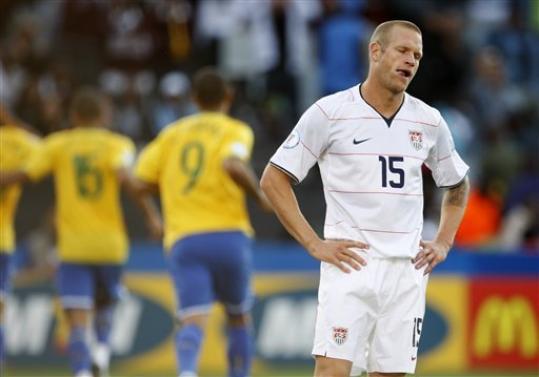
Demerit and the US ultimately fell short, but not by much...
On June 29, 1950, in a game remembered as “The Miracle on Grass,” Team USA beat traditional international powerhouse England 1-0 in a World Cup game in Brazil.
As the score was wired back to newspapers in England, sports editors were so convinced a mistake had been made during transit that some even printed the score as 10-0 to England in the next day’s edition.
They would soon be told of their mistake.
At the time, many thought the U.S. might soon become a real force in world football. Alas, such an emergence did not happen, and the country continued to operate on the fringes of the football fraternity.
Nearly 59 years to the day since that famous result, all that changed.
Despite a defeat to Brazil in the Confederations Cup final, the U.S. announced themselves as genuine competitors on the world stage.
Any team can pull off an unbelievable result, as the U.S. did in 1950 and against Spain in the Confederations Cup Semifinal on Friday.
But to go on and push another world-class side right to the limit, as the U.S. did in the final against Brazil, indicates that perhaps that is the level at which the team belongs.
It wasn’t quite a second “Miracle on Grass” for the American team, but at one stage it looked like it just might be. After goals from Clint Dempsey and Landon Donovan gave the U.S. a 2-0 half-time lead, Brazil fought back in the second half valiantly and showed their renowned class as they ran out deserved 3-2 winners.
Luis Fabiano (twice) and Lucio combined to deny their opponents, but the American’s assent to football’s top table was already complete.
“It’s a tough one to see slip away,” said U.S. coach Bob Bradley after the game. “We gave the goal up so quickly in the second half that we put ourselves in a tough spot. But I’m extremely proud of the team.“
Two weeks ago, the U.S. were viewed as dark horses, even in a tournament of only eight teams. The elite teams in the world—Spain, Italy, Brazil, etc.—would not have lost sleep about the team as potential opponents.
Now, however, no international team will take the US for granted.
Still, fans of the U.S. team should not get ahead of themselves. No one should fool themselves into thinking that the Confederations Cup is a big international tournament, one of prestige and standing within the world game.
It isn’t.
By the next tournament, in four year’s time, the result of this final will barely be remembered—that does not indicate a world-class tournament.
But, by the same token, the small field is one of undisputed quality. America beat arguably the best national team in the world, Spain, in the semifinals, and pushed the game’s traditional powerhouse to the limit in the final.
They mixed it with the best of them, and will have learned a lot from this experience.
“We continue to try and move ourselves forward, and playing these sort of games only helps,” Bradley said. “I hope people around the world will see we have good players and good results, and hopefully, we will get even better.”
The trophy cabinet may still be empty, but the U.S. has finally arrived on the world scene.
They might not be expected to win international tournaments in future—few teams ever are—but they will certainly be expected to progress to the later stages of any competitions they enter.
That is a small, but significant shift in status.
With two impressive results, they have gone from novelty act to, if not the main event, certainly top of the undercard.
“They are now a bit more confident about their capacity on the world stage,” said French World Cup winner Marcel Desailly. “They have some good players and have shown that when you play tight and strong, then you can achieve something. I can see some disappointment on the players’ faces, but c’mon, it was Brazil in front of you.”
Traditionally, American squads have travelled to international tournaments with little more than hope.
In a year’s time, assuming all goes well in the remainder of the qualification process, Team USA will return to South Africa with more than hope; they will travel with expectation, too.
As much as it might pain the rest of the world to admit, the U.S. are now a force to be reckoned with—even at the highest levels of what they call “soccer.”
On June 29, 1950, in a game remembered as “The Miracle on Grass,” Team USA beat traditional international powerhouse England 1-0 in a World Cup game in Brazil.
As the score was wired back to newspapers in England, sports editors were so convinced a mistake had been made during transit that some even printed the score as 10-0 to England in the next day’s edition.
They would soon be told of their mistake.
At the time, many thought the U.S. might soon become a real force in world football. Alas, such an emergence did not happen, and the country continued to operate on the fringes of the football fraternity.
Nearly 59 years to the day since that famous result, all that changed.
Despite a defeat to Brazil in the Confederations Cup final, the U.S. announced themselves as genuine competitors on the world stage.
Any team can pull off an unbelievable result, as the U.S. did in 1950 and against Spain in the Confederations Cup semifinal on Friday.
But to go on and push another world-class side right to the limit, as the U.S. did in the final against Brazil, indicates that perhaps that is the level at which the team belongs.
Continue reading →
June 29, 2009
Posted by alexdimond |
Sport, World Football | Confederations Cup, USA, World Football |
Leave a comment
He’s one of the best, if not the best, strikers in world football right now. But despite openly wanting a move away from Valencia, a combination of factors look set to scupper the possibility of a transfer. David Villa isn’t going to just let that happen…
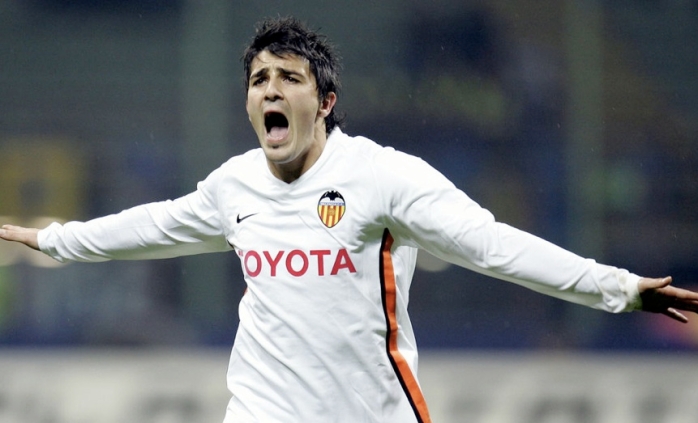
Villa: Will do all he can do to encourage a transfer. Score goals...
A man who willingly lets himself become a victim of circumstance is invariably a man who never achieves his ultimate ambitions.
David Villa is keen that he does not become a victim of circumstance.
Over the past year, the Valencia striker’s name has been linked with almost every top club in Europe but, despite a concerted recent effort from those around him, a move has yet to materialise.
At 27 years of age, the prolific hitman knows that he needs to move soon if he is to achieve everything the game has to offer, at least at a domestic level. Valencia will be competing in the newly-formed Europa League next season but, like all world-class footballers, Villa craves a shot at the Champions League and the opportunity to win league titles.
With Valencia’s well documented financial troubles, it is unlikely the Mestalla-based outfit will be able to reach that stage in the immediate future.
And it is not as if the striker isn’t coveted by clubs that can offer him such opportunities. With his reputation buoyed—along with the rest of the Spain squad—as his country won 2008’s European Championship, Villa took his spectacular form into the 2008-09 season, scoring a stunning 49 goals in 58 starts across international and club games.
In the process, he cemented his position among the very best strikers in the game today.
Less than a week ago, Valencia were openly shopping around their crown jewel to anyone who might feasibly stump up the asking price, believed to be €53m. Barcelona, Real Madrid, Manchester United and Chelsea (among others) were believed to be queuing up to speak to the player affectionately known as “El Guaje” (The Kid).
Now, however, it is a slightly different matter.
“Villa is not for sale,” Valencia’s president, Manuel Llorente stated this week. “But if there is an offer that is scandalously scandalous we will consider it.”
No one knows the reason behind the u-turn. But having spent the past week actively approaching clubs to encourage talks, David Villa’s agent, Jose Luis Tamargo, certainly isn’t happy about it.
“We have no choice but to back out of the market with our tails between our legs,” Tamargo said. “I’m annoyed that they are toying with us like this. It would have been easier to say that he was not for sale in the first place, not say yes before and no now. I don’t like this at all.”
Disappointed but respectful of Valencia’s wishes, it appears all Villa can do now is try to persuade a club to make the “scandalous” offer his employers now require. And with some head-turning performances at the Confederations Cup over the past weeks, he has gone a long way to doing just that.
In Spain’s final group game on Saturday against a determined South Africa, Villa gave a timely exhibition of his ability to change a game at the highest level. With the game scoreless after 50 minutes, things looked bleak for Villa, when he saw his penalty well saved by South African keeper Itumeleng Khune.
But within a minute of that save, the 27-year-old responded to the disappointment with the sort of mental fortitude and goalscoring nous that few in the world game currently possess, chesting down and volleying an Albert Riera cross in one smooth movement that left Khune with no chance.
It was a goal that would have grabbed attention in boardrooms from Madrid to Manchester.The problem for Villa, however, is that attracting attention alone might not be enough. The asking price set by his club, even before they all but removed him from the market, was obviously deemed slightly prohibitive to interested parties.
No one can be sure what Llorente deems a “scandalously scandalous” offer to be, but it is safe to assume it is at least the original €53m quoted.
Chelsea and Liverpool, both believed to be fervent admirers of the striker (indeed, Rafa Benitez might be the most keen of all managers to sign him), have obviously been put off by the transfer fee—mainly due to the poor exchange rate.
Valencia’s asking price translates to £45m in the current market, but would have only been about £30m this time last year when the pound was still riding high.
At that price, at least one of the clubs would likely have fancied a bid.
Now however, the price is not a financially viable one.
Manchester United, having lost both Cristiano Ronaldo and Carlos Tevez in the past two weeks, are also evidently in the market for a striker. With £80m (over four years) to budget with as a result of Ronaldo’s sale, they could afford a move for Villa—especially considering the Spaniard’s talents are of the sort that would enhance the team and, significantly, appear to compliment Wayne Rooney’s versatility, rather than exploit it.
But the recent admission that they would not sign players over the age of 26 (Villa is 27) due to the perceived lack of re-sale value such players would have, indicates both the enforced prudence of the Glazer regime, and the unfavourable economic conditions that English clubs face in the European market.
Villa’s challenge, then, is to encourage United, or his suitors on the continent, that the various obstacles they face are worth overcoming in order to acquire his services.
In that pursuit, Spanish giants Barcelona and Real Madrid look the most likely to be persuaded. The exchange rate is not a barrier for either club, and the price demanded (assuming it still remains around the same figure) is one that they will be willing to start negotiations from.
But for Real Madrid, with upwards of €150m already invested in attackers, president Florentino Perez might not believe that Villa’s signing will create a profitable marketing frenzy in the same way his other blockbuster signings are set to.
Perez might feel it wiser to invest remaining funds in defensive reinforcements—and see which of his unwanted attackers (Robben, Van Nistelrooy, Huntelaar) have departed—before returning to Villa later in the summer.
That leaves Barcelona in the driving seat. But with a settled and successful squad, do they need to make any changes? The potential transfer of Samuel Eto’o (rumoured to be on the verge of an exit) might prove the pivotal factor, but it is almost certain the club will make no firm moves until the Cameroon international’s future is decided.
As much as he hates it then, Villa’s only off-the-field option might be to wait and see.
“Last week was not easy at all. I admit that it’s been bad for me,” Villa said after the South Africa game. “I wouldn’t wish all this on anybody but, with the advice of my family, I’ve erased it all from my mind.”
Sensibly, Villa seems to have realized that all he can do is remind football’s heavy hitters of exactly what he can contribute during games.
“When I go out on the pitch I try to show what I can do. On the pitch is where I feel better, and I’m proud to be part of this national team.”
Scoring the goals that take his country towards Confederations Cup success might not be enough to secure himself a move, but at least Villa can be consoled in the fact that there is nothing more he can do.
If Villa is to be a victim of circumstance, at least he will not be so willingly.
A man who willingly lets himself become a victim of circumstance is invariably a man who never achieves his ultimate ambitions.
David Villa is keen that he does not become a victim of circumstance.
Over the past year, the Valencia striker’s name has been linked with almost every top club in Europe but, despite a concerted recent effort from those around him, a move has yet to materialise.
Continue reading →
June 22, 2009
Posted by alexdimond |
Sport, World Football | David Villa, Valencia, World Football |
Leave a comment
He’s back, and definitely not at all disappointed to be. The Ukrainian international has publicly declared himself happy to fight for his place at Stamford Bridge, but privately expects to be offloaded before the summer is out…
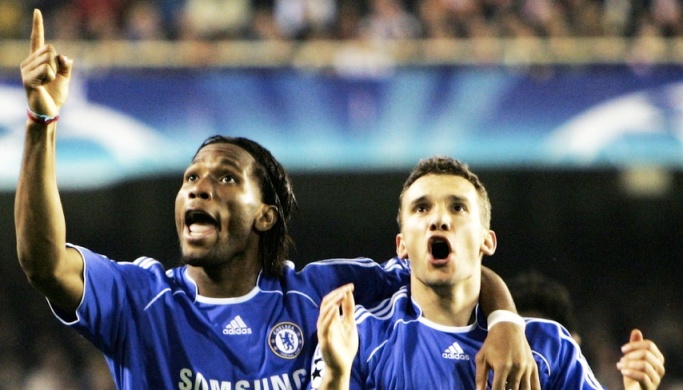
Didier Drogba is one of the players standing in the way of a happy Chelsea return for Shevchenko...
After an unsuccessful loan spell at the club where he made his name, Andriy Shevchenko is back at Chelsea — the club where his reputation was damaged so greatly — in the hope of rebuilding it once again.
Having failed to make a real impact during last season’s return to AC Milan — scoring just twice in nine starts — the Ukranian striker will make his way back to Stamford Bridge ahead of the new season, and is positive about the opportunity.
“I have one year left on my contract with Chelsea,” Shevchenko told Corriere dello Sport, “and I intend to respect it and honour it in the best possible way.”
Continue reading →
June 22, 2009
Posted by alexdimond |
Sport, World Football | Andriy Shevchenko, chelsea, World Football |
Leave a comment











My first England cap: Some brief thoughts and recollections on joining the Wembley media corps
So, I got the chance to cover England’s opening Euro 2012 qualifier against Bulgaria at Wembley. As my first game covering the Three Lions as an accredited member of the media, I thought I’d better note down some memories…
Wembley way: My view from my privileged position at the home of football
I never thought I’d get an England call-up at 23.
Okay, so Theo Walcott or Wayne Rooney might not be particularly impressed with my achievement — nor any player to actually get a proper cap for England, for that matter — but when your professional football dream falls apart at the age of 12 and you subsequently try to make the media your career like I have, then your first appearance in the hallowed press zone at Wembley seems like a milestone worthy of some note.
I wouldn’t call it a debut to remember by any means, but I think I got through the 90 minutes with enough nice touches to suggest I might one-day have a future at this level. A nervous start (my wide-eyed fear and hesitancy upon entering the media centre seemed to only convince the security attendants I harboured terrorist intent) eventually subsided into an enjoyable and slightly more self-assured second-half performance, and by the end of it I was… blocked from entering the mixed zone.
So, er, still work to be done then.
Nevertheless, it was a great experience. Wembley, as you would expect, is run like clockwork, with helpful and seemingly endless numbers of staff making sure you don’t get too far off the yellow brick road. One polite lift attendant (believe it) even indulged in small talk with myself and the BBC’s very own ‘expert’ Mark Lawrenson on the way up to the media centre, with the former Liverpool man even opining that “with programmes costing £6, I’m in the wrong game.” The attendant was happy to agree with him, which I can only assume was out of politeness, as spouting inane clichés about football every Saturday evening seems about as a good a ‘game’ as you can be in to me.
But I digress.
The media centre itself is something of a joy to behold, divided as it is into two sections. The first, slightly smaller in size, looks like a high-tech library with its rows of identikit cubicles with ports and wires for every computer accessory known to man. Continue reading →
September 6, 2010 Posted by alexdimond | Comment, World Football | england, Wembley, World Football | 1 Comment